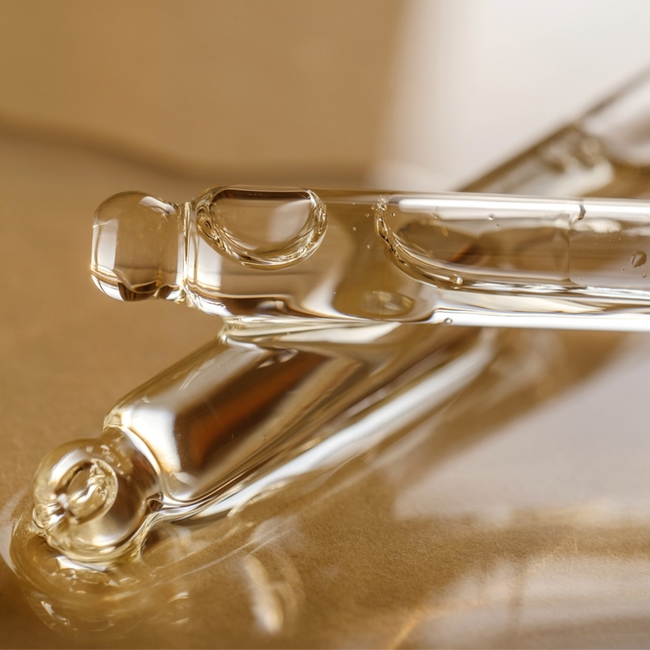
Collagen Serums
Maintaining adequate collagen production in the body is vital for keeping elasticity and firmness in your skin, but applying it directly to your complexion has proven to not be quite as effective as it may seem. “Collagen is a large molecule so it may not be able to penetrate the skin to deliver anti-aging benefits,” explains Garshick. “While it’s not dangerous to use, it is not the most effective method of boosting collagen in the skin.
Instead it can be helpful to incorporate retinol or retinoids, which are vitamin A derivatives that boost collagen production or peptides, which are able to promote collagen synthesis." Another more effective way of increasing collagen production is by consuming collagen-rich foods such as fish, egg whites, and berries which can help tighten and brighten your skin from within. That being said, don’t waste your money on a topical collagen serum.
Collagen Creams
Since many brands of collagen creams "don't penetrate deeply enough into the skin" to cause any significant long-term change or benefit to wrinkling skin, Casey says that the "best medicine for your skin's collagen is prevention. "A broad spectrum (protects from both UVA and UVB rays) sunscreen with SPF 30 or higher prevents the UV rays of the sun from penetrating into your skin and causing collagen and elastic fiber breakdown," she adds. Instead of opting for a collagen cream, Casey recommends looking elsewhere. "The most effective creams to build collagen in your skin are prescription-strength retinoid creams, such as tretinoin," she explains.
Tretinoin, aka retinoic acid, penetrates to the level of the dermis of your skin and helps build collagen, leading to firmer, healthier, more youthful-appearing skin. "I like to think of retinoid creams as 'daily exercise for your skin,'" Casey continues. "With consistent, regular use, your skin will become stronger and firmer, and retinoids confer significant health benefits to the skin as well." As for why collagen creams truly "don't work," Casey says they typically don't contain a clinically significant level of active ingredients (active ingredients include retinols, vitamin C, peptides, etc). "There is tremendous variability in the type and strength of retinols that are available over the counter," she stresses.
Coconut Oil
Many people utilize coconut oil as a hydrating topical solution, but this ingredient has not proven to be particularly beneficial in any anti-aging capacity. “While commonly used on the skin for its moisturizing benefits, there is not enough evidence to show that coconut oil has specific anti-aging benefits. It is also considered comedogenic, meaning it can clog the pores and worsen breakouts, particularly in those with oily skin,” warns Garshick.
“For someone looking to boost moisture while also getting an anti-aging benefit, it can be helpful to consider ingredients like hyaluronic acid which helps to boost moisture and plump the skin, offering a temporary improvement in appearance of fine lines and wrinkles,” she adds. In general, putting food ingredients on your face isn’t best practice within your skincare routine, so coconut oil will be best left to your diet and not your beauty regimen if you truly want to enhance your natural glow and defeat wrinkles at the source.
Olive Oil
Olive oil can often be found in a variety of hydrating and anti-aging skincare products, but Garshick explains that once again this ingredient truly has no benefit for ridding your complexion of fine lines and wrinkles. “While olive oil is rich in hydrating ingredients as well as antioxidants, by itself, it is unlikely to be the only thing to help improve the signs of aging,” she says. “The antioxidants help to protect against free radical damage which can have some benefits over time. While there are some antioxidant benefits with olive oil, it may be best to opt for Vitamin C, which not only has antioxidant benefits but is also important for collagen production.”
What To Use Instead
While it may be disheartening to hear that the products you use every day don't actually do anything to turn back the hands of time and help wrinkles vanish, there are still plenty of ingredients out there that can actually do wonders for aging skin.
For starters, Retinol is one highly effective product dermatologist Mina-Jacqueline Au says every women should have in her routine to promote a more youthful complexion. "Retinol encourages cell regeneration as well as helps bind cells with moisture within the dermis, so the skin becomes plump," she says. "It also synthesizes collagen and elastin production, which is crucial for anti-aging. As collagen is replenished, old skin cells are shed, fine lines recede and skin begins to reveal a brighter, smoother texture." Nice!
Vitamin C is another fantastic option to use daily. "Vitamin C is absolutely essential for producing collagen and elastin in the body, keeping the skin plump, firm, and younger-looking," Au raves. She says you should use this ingredient in the morning, while Retinol is most effective when it can work its magic overnight.
On the whole, sticking to retinol, retinoids, and vitamin C to do the heavy lifting for your anti-aging routine will provide the most significant results, and leaving the less effective ingredients out of your lineup will reduce the risk of skin irritation, breakouts, and clogged pores.


